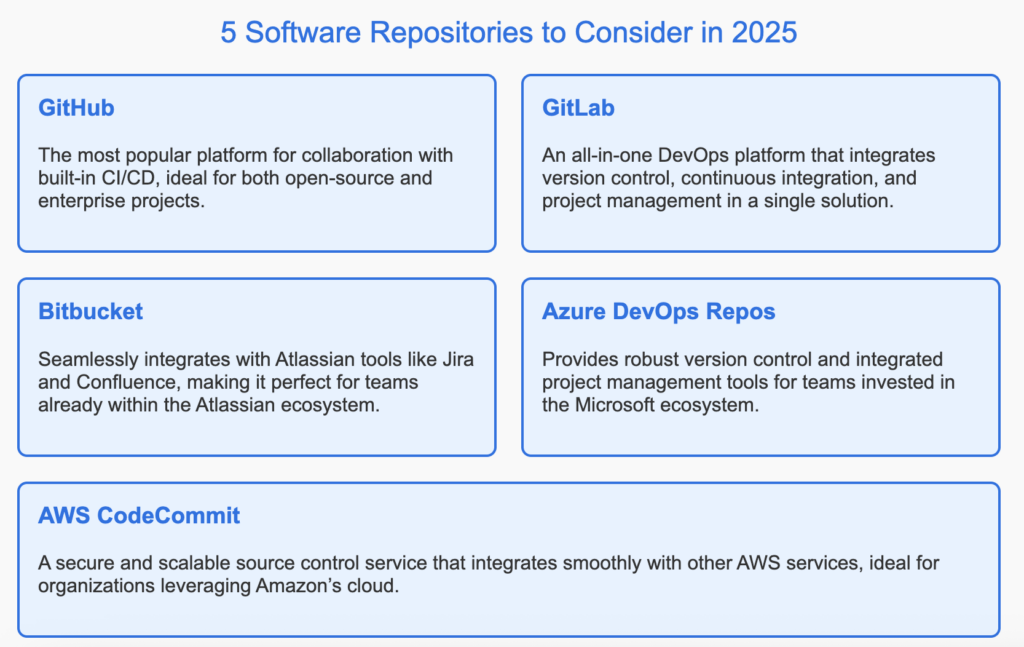Software repositories or repos enable developers to easily store and access resources and collaborate with other developers regardless of location. As a result, software development projects can be completed quickly and with greater transparency.
In this post, we define a software repository, discuss its features, and explain how to choose one. We also share some popular options you can consider. Read on to learn how software repositories can streamline your projects and enhance your development team’s productivity.
What is a Software Repository?
A software repository, also known as a code repository, is a centralized location developers use to make and manage changes to an application’s source code.
During the software development process, developers need to store and share folders, text files, and other types of documents. A code repository has features that allow developers to easily track code changes, edit files simultaneously, and collaborate on any project from any location.
There are two main types of software repositories: Public and private repositories. Public repositories are accessible to everyone on the internet. Some examples are GitHub, GitLab, and the Python Package Index (PyPI). Private repositories, on the other hand, are only accessible to you and people you explicitly grant access to.
12 Main Features of Software Repositories
The following are key features offered by software repositories:
1. Version Control
One of the core features of a software repository is version control. It allows developers to track changes made to the codebase over time, revert to the previous version if needed, and maintain a detailed history of all modifications.
Popular version control systems like Git, Subversions (SVN), and Mercurial are commonly used in software repositories.
2. Vulnerability Testing
In order to secure hosted packages, software repositories have vulnerability testing systems. These help them to evaluate the strengths or weaknesses of their security systems. If any security vulnerability is discovered, the repository owners can take the required measures to prevent attacks from malicious users.
3. Package Management
Every code repository contains a package manager to oversee processes like installations, configurations, upgrading, and removal of packages.
Package owners publish the packages into the repository with the package managers. Package users search, install, update, and remove packages from their computers with the package managers.
4. Code Reviews and Pull Requests
Many repository and hosting services, such as GitHub and GitLab, offer code review and pull request features.
Developers can submit their changes and pull requests, which allows other members to review the code, provide feedback, and approve or reject the changes before merging them into the main codebase.
5. Encrypted Storage and Backup
Security is critical for software repos, especially private ones. Thus, encryption of the package source code safeguards it from being exposed to malicious actors.
6. Collaboration and Access Control
Repositories promote collaboration among developers by allowing multiple team members to work on the same codebase simultaneously.
Access control mechanisms control how and who accesses the packages. This is important for the security of the repository.
7. Branching and Merging
Branching allows developers to create separate copies of the codebase, known as branches. Then, they can work on new features and bugs independently without affecting the main code. Once the changes are tested and approved, they can be merged back into the main branch.
8. Issue Tracking
These systems enable developers to report bugs, request new features, or discuss improvements to the codebase. These issues can be assigned to specific team members, prioritized, and tracked through their lifecycle.
9. Static Code Analysis
This feature makes it easy to debug software packages without having to execute the packages. It is valuable for discovering and rectifying errors in package code to ensure the packages perform well after installation.
10. Release Management Tools
The benefit of this feature is that it helps you track the versions of different packages as they undergo upgrades. A user can install the exact version of a package that they intend to use.
11. Documentation and Wikis
Most repositories include a section for hosting documentation called a wiki. You can use the repository wiki to share long-form content about your project, such as how you designed it, its core principles, or how to use it.
12. Statistics and Reporting
Software repositories offer package statistics and dashboard reports. This enables you to view package details like versions, number of installments, upgrade frequency, etc.
How to Choose a Software Repository
There are many different software repositories, and each has its unique features. So before choosing one, consider the following.
1. Define Your Requirements
Determine what you need from a repository. Consider what types of files you’ll store, required version control features, collaboration needs, and any regulatory or compliance requirements.
2. Evaluate Repository Types
Decide between distributed systems (like Git) or centralized ones (like Subversion). Most modern teams prefer distributed systems for their flexibility and robust collaboration features.
3. Security and Compliance
Look for repositories that offer strong authentication, encryption, and audit trails. These features help protect your code, ensure data integrity, and meet industry compliance standards.
4. Integration and Workflow
Choose a repository that seamlessly integrates with your existing tools—such as continuous integration systems, project management platforms, and code review tools—to streamline your workflow.
5. Cost and Support
Assess the total cost of ownership, including subscription fees, hosting costs, and support services. Look for a solution that offers reliable support and can scale as your team grows.
6. Scalability and Performance
Ensure the repository can handle your growing volume of code and data without compromising performance, so your development team can work efficiently even as your projects scale.
Project Specifications
One of the main factors to consider before choosing a software repository is the scope of your project. The kind of data the project will deal with, the data size, and the volume of commits for the project need to be considered.
Specific types of software repositories perform better with certain specifications. So, define the scope of your project to help you make the right choice.
Team Size
A one-person team has a much wider selection of repository software to work with. However, if the project involves two or more developers, then the project manager needs to consider the permission levels.
Version Control Compatibility
Examine how compatible your version control system is with the repository hosting service. Ensure you test it thoroughly to avoid any issues down the line. For instance, if you are using Ruby, find a repo that supports it.
Deployment Options
Another factor to consider is whether you want to use a hosted repository service or keep your repository in-house.
A hosted repository service will relieve you from management tasks like backups and server maintenance. It will also provide tools for measuring, discussing, monitoring, and managing software development efficiency.
An in-house repository, on the other hand, will demand more effort and resources. However, you get improved security and control over proprietary code and sensitive data.
Performance and Ease of Use
Software repositories aren’t equal, so performances will differ. The same applies to their interfaces. Each repository will have a unique approach to achieve the same results. So, consider elements like their upload or download speed and how you can upgrade to additional functionalities.
Integration Options for Third-Party Solutions
If your team is using third-party services or external tools, choose a code repository that integrates seamlessly. Whether it is a customer support management tool or a project management software, these integrations will streamline your workflow and boost productivity.
Release Schedule
Will there be regular updates or larger small releases over different periods? Or do you need a hosting service that offers continuous integrations and continuous deployment?
Many repository services offer several options that may meet your needs. There are even some that offer issue tracking and release management tools that you can choose from.
Cost
Cost is a super vital criterion to consider before choosing any resource for your project. This price will depend on the type of software repo you choose.
Public software repositories are free and allow you to share and collaborate with others on package development.
Private software repositories require a fee based on the number of users, the number of stored packages, the number of requests made, and the amount of transferred data.
5 Software Repositories to Consider in 2025

Below are five software repositories to consider in 2025, along with a brief explanation of each—as if you were a hiring manager learning how these platforms function and why they matter:
1. GitHub
GitHub remains the world’s most popular platform for hosting code. It’s like a massive online community where developers not only store and manage their code but also collaborate on projects. With integrated CI/CD features and powerful code review tools, GitHub is ideal for both open-source and enterprise projects.
2. GitLab
GitLab allows you to choose between the free community edition and a paid subscription for the enterprise edition. One of its features that stands out is the ability to install GitLab on your server. You can use the repository hosting service with custom domains and hosts. Plus, it also has a built-in CICD for code building, testing, and deployment.
3. Bitbucket
Bitbucket, an Atlassian product, integrates seamlessly with other Atlassian tools like Jira and Confluence. It’s especially used by teams that already use the Atlassian ecosystem. It’s like having a repository that not only stores code but also ties directly into your project management system, keeping everything coordinated.
4. Azure DevOps Repos
For teams invested in Microsoft’s ecosystem, Azure DevOps Repos provides robust version control integrated with a suite of project management and CI/CD tools. It’s similar to having a well-organized digital filing system that works hand in hand with the rest of your business’s software tools.
5. AWS CodeCommit
AWS CodeCommit is a fully managed source control service designed to integrate seamlessly with other Amazon Web Services. For organizations already leveraging AWS for their infrastructure, CodeCommit offers a secure and scalable solution that’s built to grow with your business—much like a custom-built warehouse optimized for your specific needs.
Each of these repositories offers its own strengths, so the best choice depends on your team’s workflow, existing tool ecosystem, and the scale at which your organization operates. They all support modern development practices like CI/CD, strong security features, and collaborative workflows that help reduce the burden of technical debt and improve overall productivity.
Leverage Software Repositories for Better Project Outcomes
Software repositories are valuable tools for software development. They provide a central location for developers and other stakeholders to store and share project resources. Repos also facilitate collaboration among developers. Multiple team members can work on the same codebase simultaneously without overwriting each other’s changes.
However, the right software repository for you will depend on your project, integration options, release schedule, and cost.
If you’re looking to hire software developers adept at using software repositories, contact us. We are DistantJob, a remote recruitment agency that finds the best tech talents. Our innovative approach to remote recruitment allows us to connect you with top-notch developers globally.





